Masse Frères Desvres pair of very large Rouen style handpainted covered vases
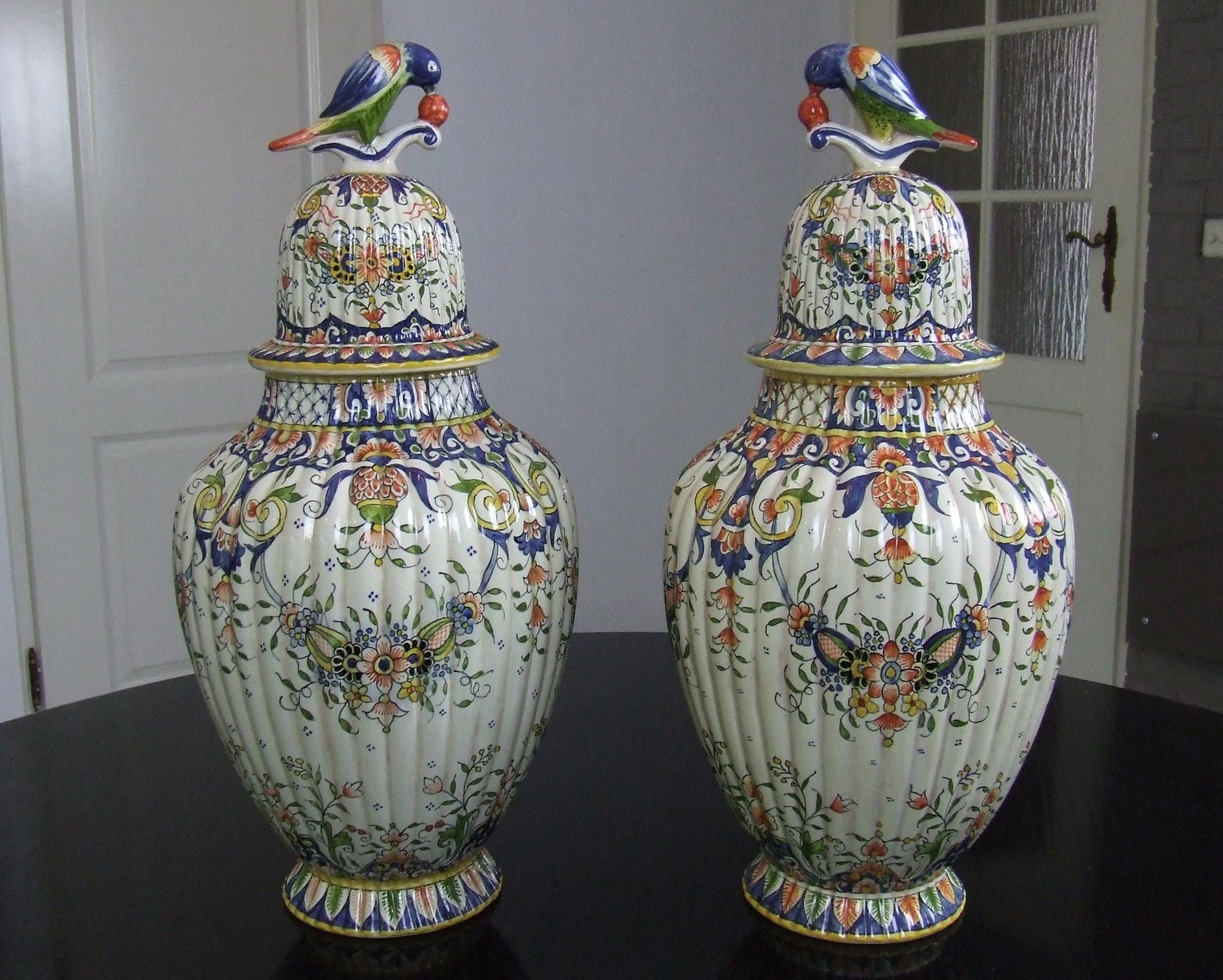
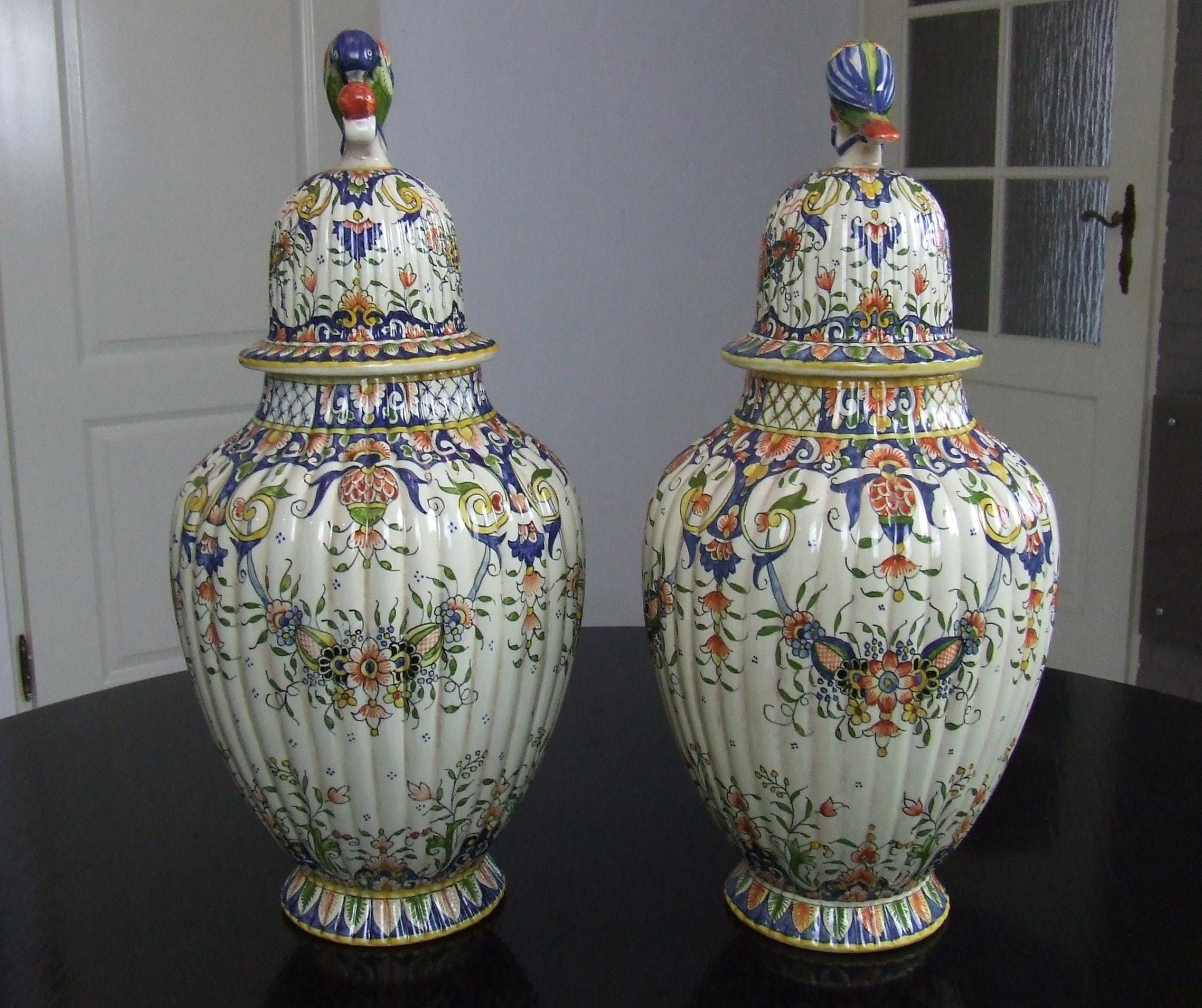
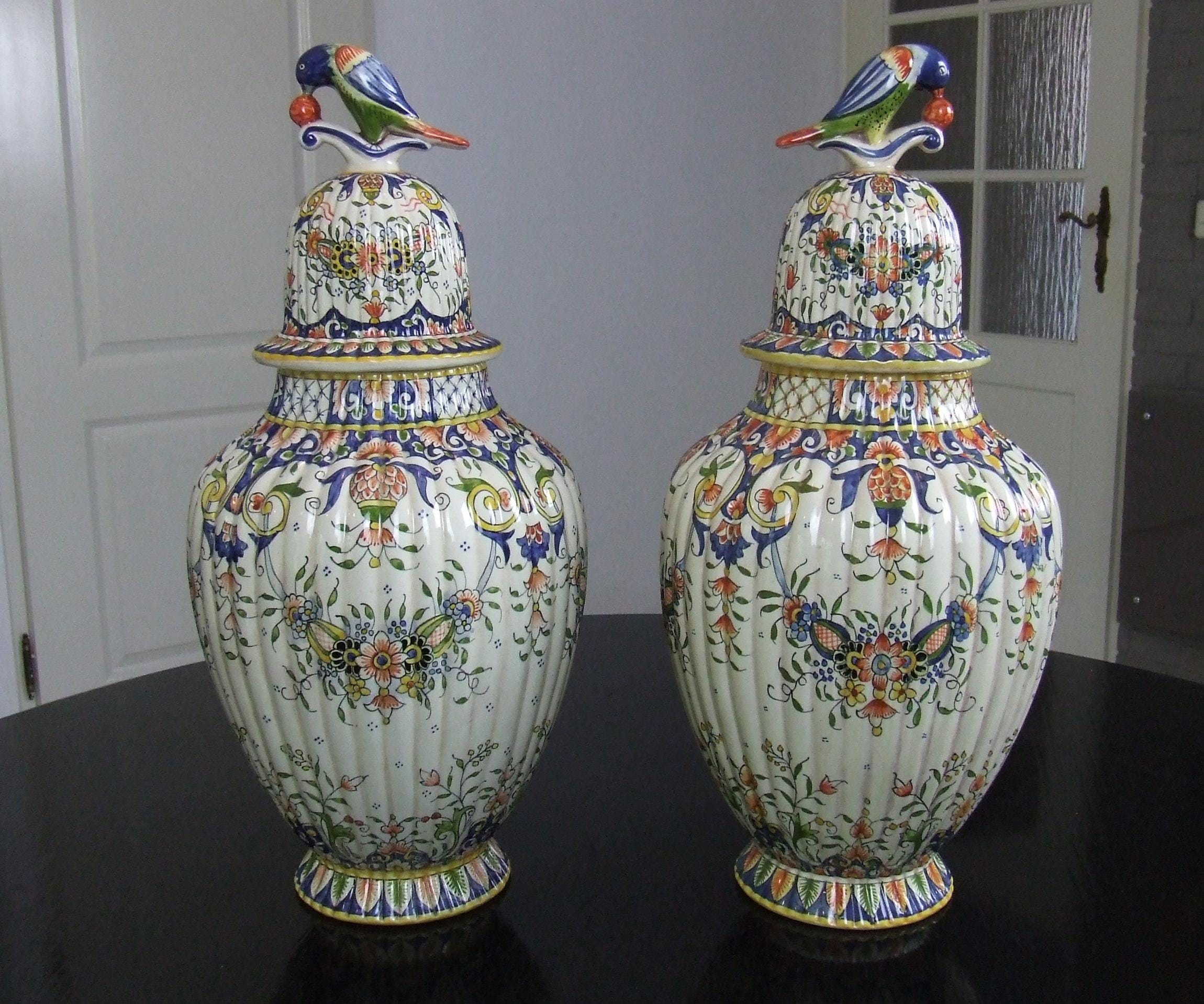
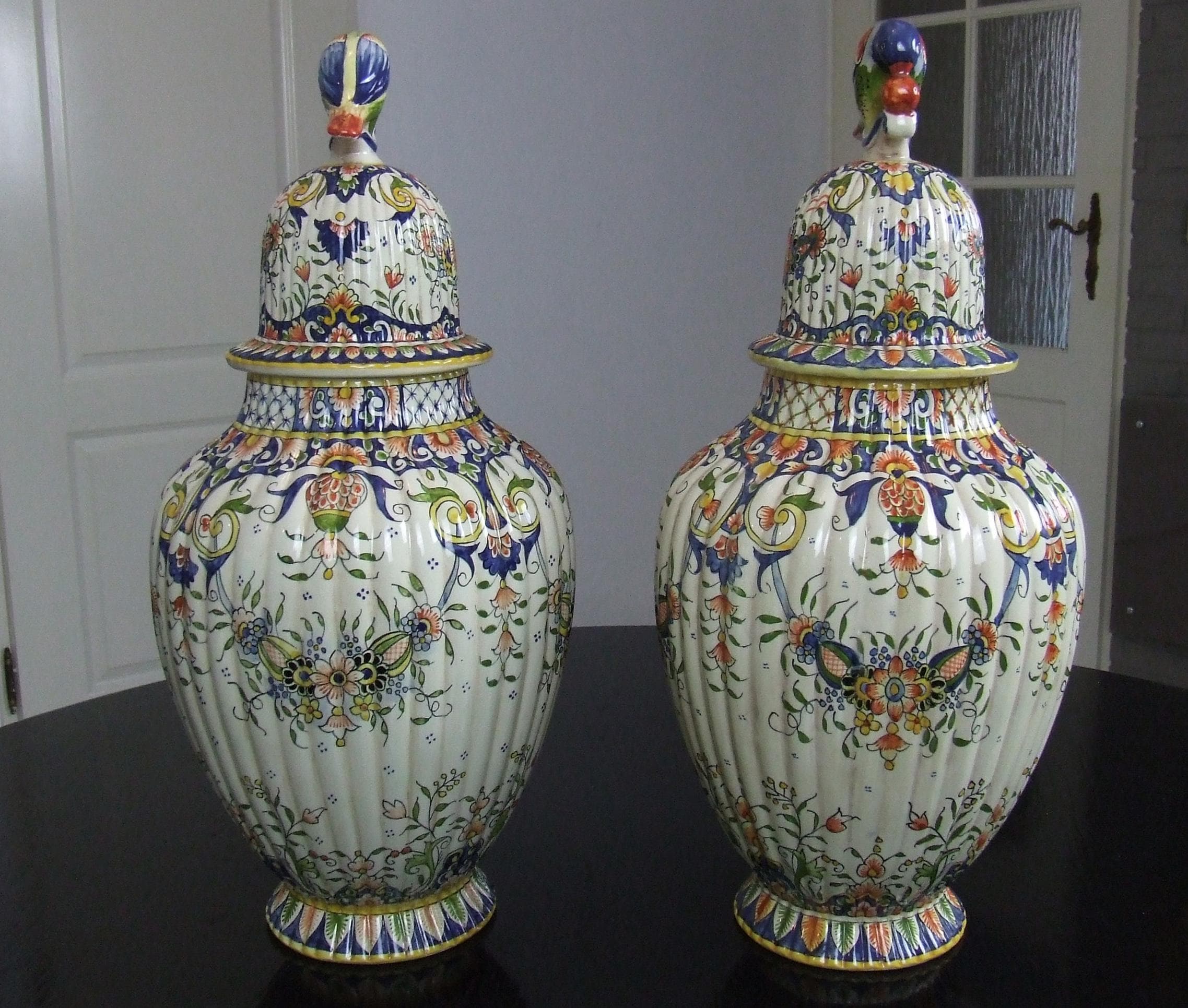
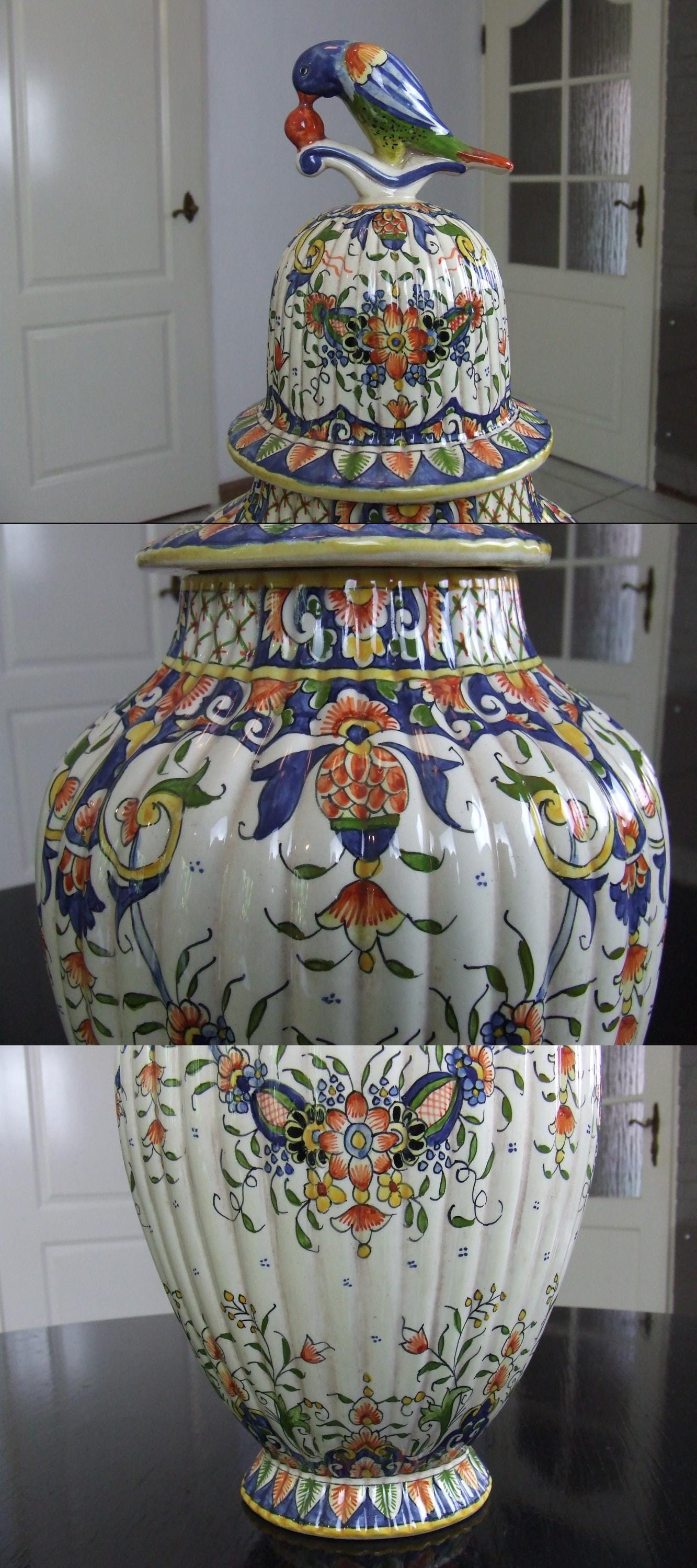
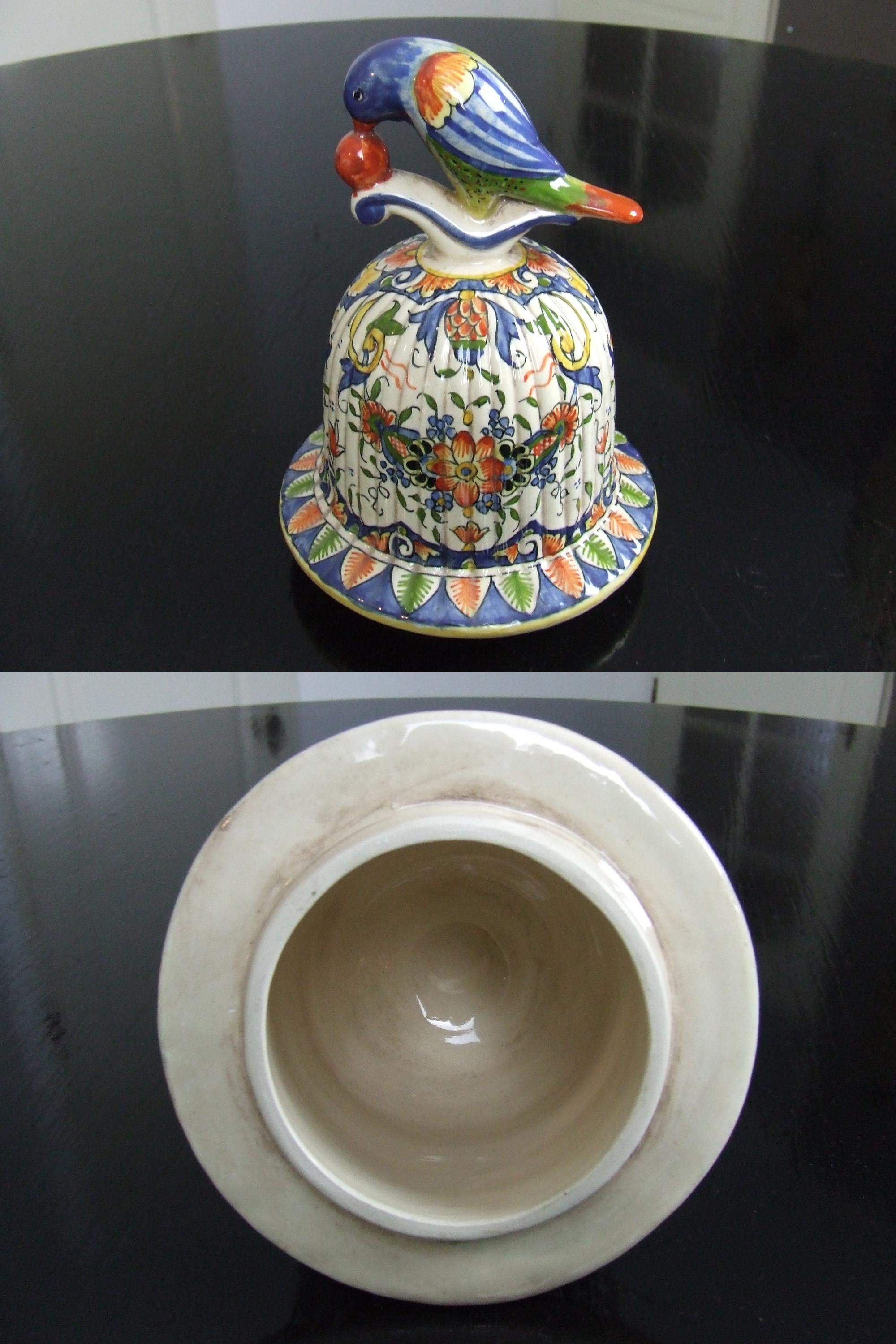
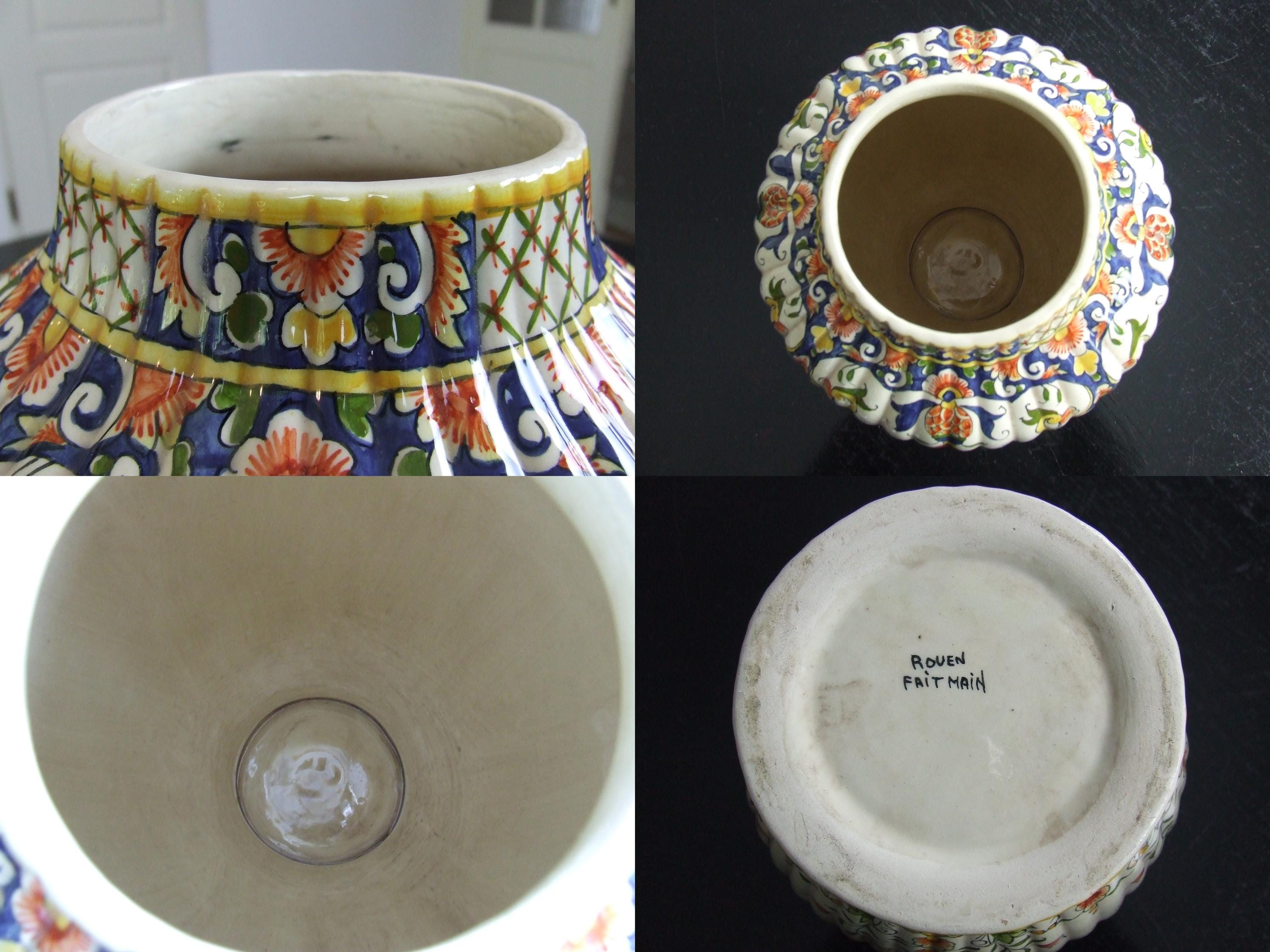
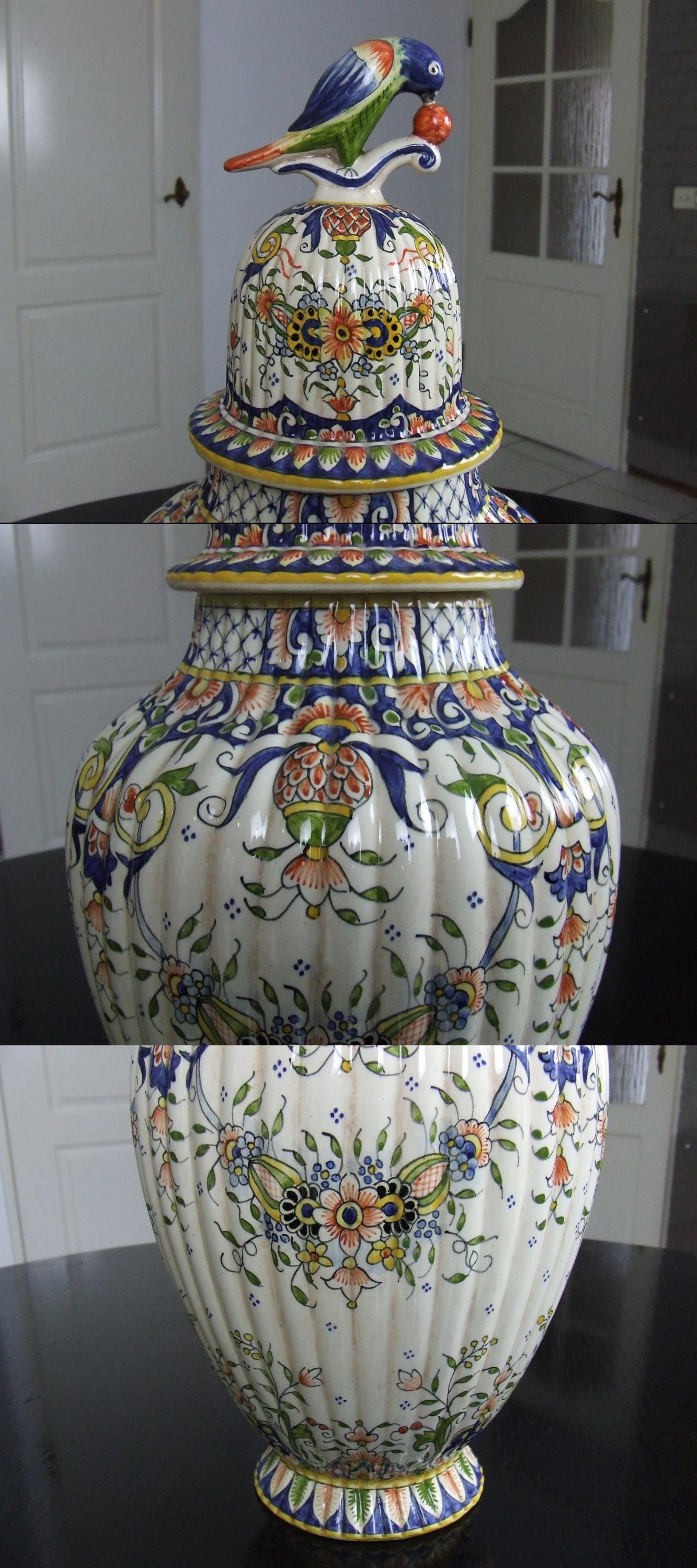
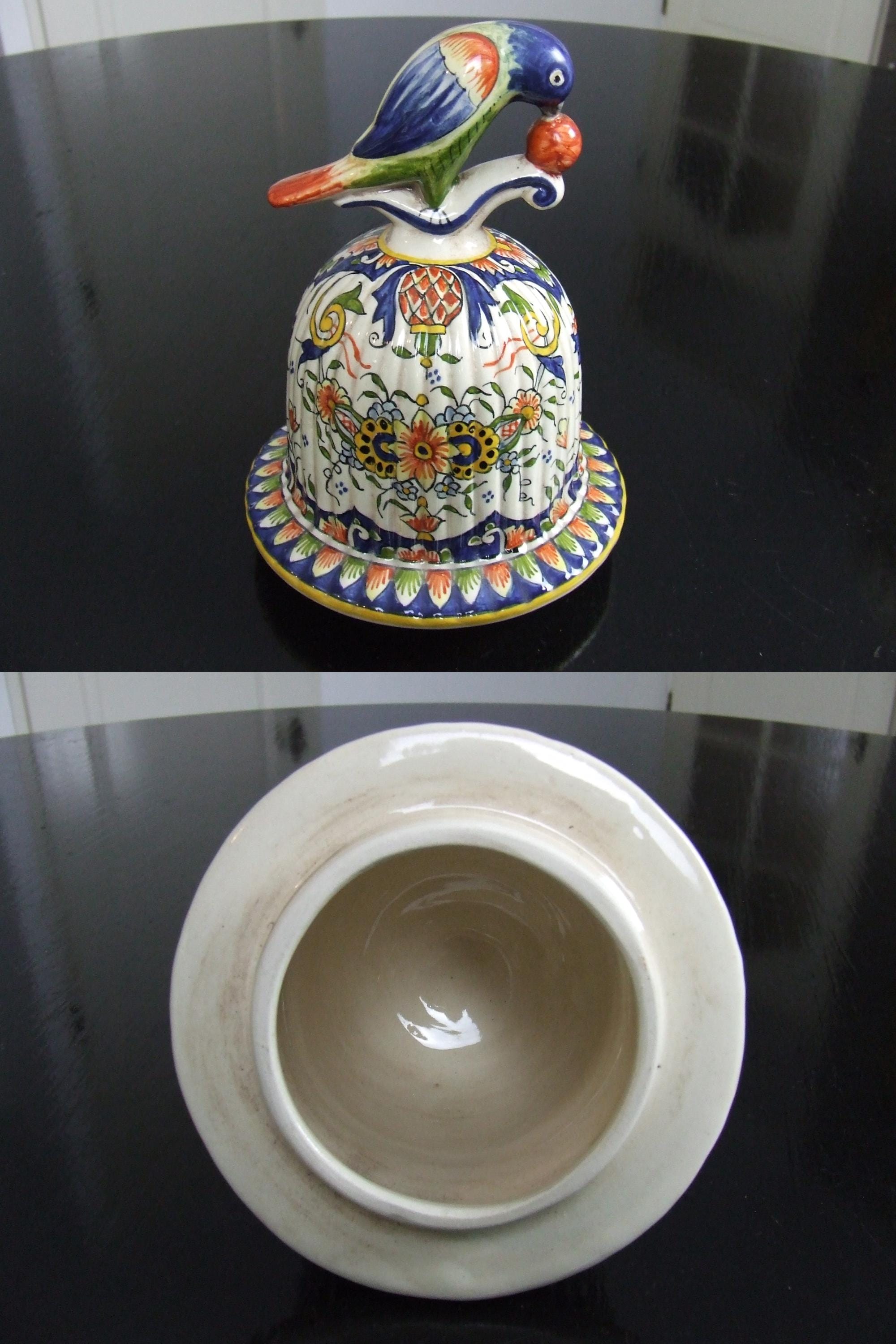
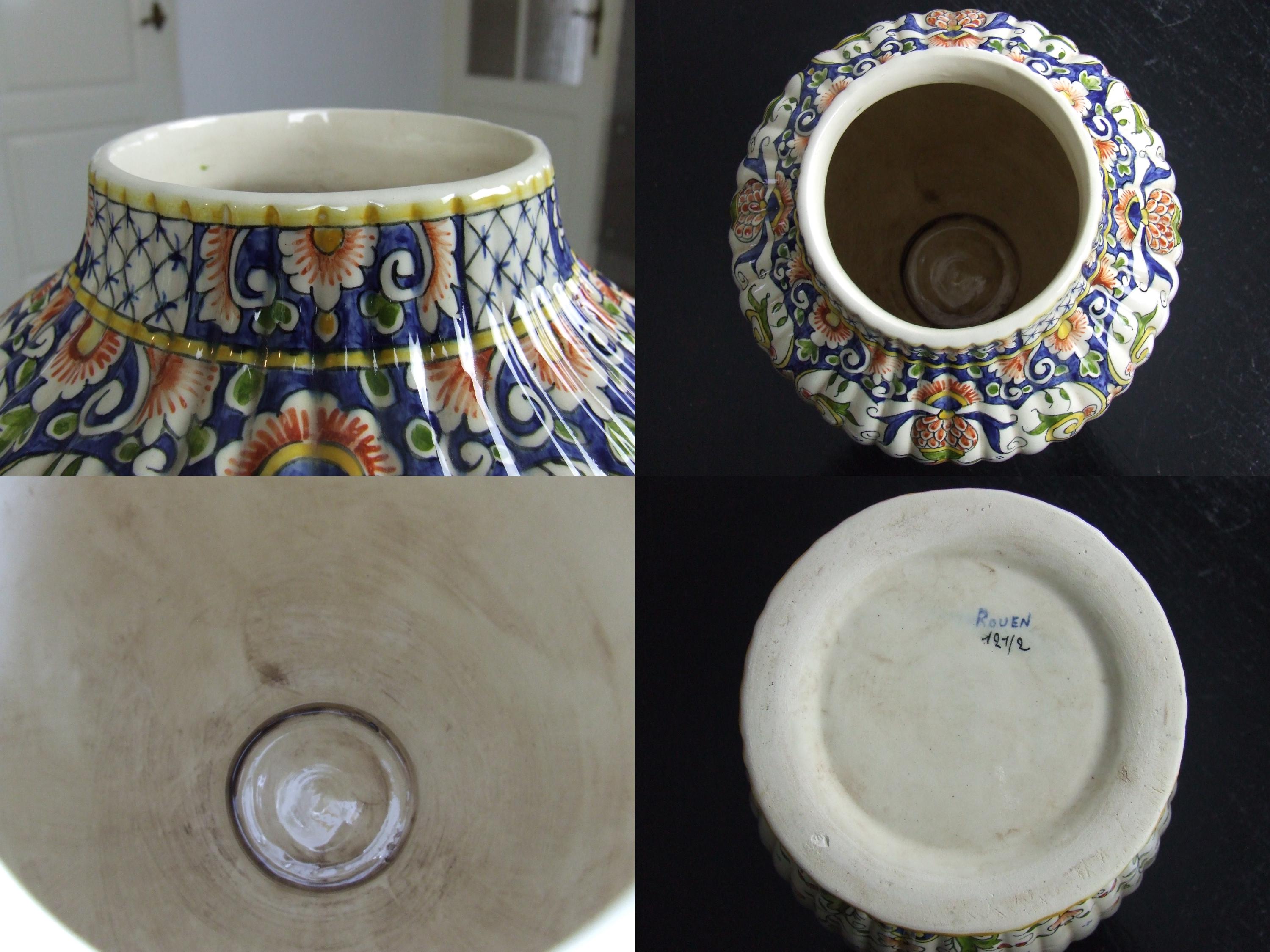
Beautiful and impressive pair of very large (50,5 cm high) handpainted covered vases made between 1955 and 1982 by Masse Frères in Desvres, France.
The vases have a Rouen style decoration painted in blue, green, black, yellow and russet (reddish brown) colours on a cream white background. The decoration is painted in the style of faience that was made by the factory of Louis Poterat in Rouen during the late 17th century (1673–1696). This style is characterised by lambrequin (mantling, drapery style) elements, combined with baroque scalloped border patterns painted in predominantly red, yellow and blue colours.
These characteristics can also be seen here, the vases are decorated on four sides with pendant flower ornaments, hanging by drapes from the upper ornamental border of the vase. From the lower ornamental border, delicate flowers sprout upwards. The foot is decorated with pointed petals. The lid has a matching pattern, with flower ornaments on two sides, ornamental upper and lower borders and pointed petals on the edge of the lid. The lid is crowned with a finial in the shape of a bird picking into a berry.
The vases are ribbed, which adds an extra sheen to the glaze. On the inside of the folds of the ribs, and also on the inside of the vase and the lid, some 'dirt' is visible, which actually is not real dirt (we clean all vases thoroughly before we put them online), but a colouring to give the vases an older, more antique look. So this 'dirt' is actually painted, intentional and cannot be removed!
The vases are signed at the bottom with a handpainted mark, one vase with "Rouen" and "fait main", the other vase with "Rouen" and "121/2". "Rouen" is the style of the decoration, "fait main" means "handmade" in French and indicates the piece is handmade (and handpainted). The number "121/2" indicates the model of the vase.
Vase model 121/2 has been used by Masse Frères with other types of decorations as well, for example on this page https://faience-de-desvres-terra-incognita.fr/formes-fourmaintraux-masse/ of an excellent site about faience from Desvres, we can find the 121/2 model with Delft style decorations under the "Potiches" (pots, covered vases) section.
Our 121/2 model with the "Rouen" decoration is shown in a factory catalogue of Masse Frères of 1960, which can be found here: https://faience-de-desvres-terra-incognita.fr/catalogue-masse-freres-annee-1960/. It is shown on page three (under "Rouen d’après L. Poterat"). It is not present in the earlier catalogues of 1930 and 1950 of Masse Frères which can be found on the same website, which may indicate that this "Rouen after L. Poterat" decoration was only introduced during the 1950s. For this reason we assume that these vases have been made after 1955.
Condition: Excellent, there are no damages, cracks, hairlines or restorations. The glaze of the vases has no visible wear, no crazing and a beautiful sheen. The inside of the vases is fully glazed and clean.
An impressive pair of vases, which will add style and elegance to any interior!
Made by: Masse Frères
Place of manufacture: Desvres, France
Year of manufacture: between 1955 and 1982
Model (catalog) nr.: 121/2, with "Rouen d’après L. Poterat" decoration
Method of decoration: handpainted
Size: height: 50,5 cm, diameter: 24,1 cm (capacity: 8 litres each)
Weight: 3,1 and 3,6 kg (total weight 6,7 kg)
Additional pictures of the objects can be provided if required.
----------------------------------------------------------------------
About Masse Frères:
In 1903 Francis Masse bought an earthenware factory called the 'Gazon' located in Desvres. The factory had formerly been owned by Fourmaintraux Frères, who had started in 1879 there with the production of artistic earthenware in Delft, Rouen and Nevers styles, often copying antique designs. Francis Masse first focussed on producing tiles, but after 1914 also started producing earthenware with Rouen and Delft style decorations. Francis Masse modernized the earthenware factory thoroughly before he died in 1923. With the help of her two sons, Madame Masse diversified production and launched a series of porcelain in the style of Sèvres, Chantilly and Capodimonte (Neapolitan factory). Occasionally weakened by the two world wars and the economic crisis of the 1930s, the company underwent a reorganization in 1942 and took the name of the Masse Frères (Masse Brothers) earthenware factory. Up to 144 workers operated the earthenware factory in 1965. The following decades became difficult and led to the sale of the company in 1982.
Jean Muselet took over the Masse earthenware factory in 1982, which became Les Artistes faïenciers. Marie Muselet, his wife, managed the company and launched the Marie d’Artois collection. In 1990, she also bought the Fourmaintraux-Dutertre company. Production ceased at Gazon and was refocused on the Poterie site in Desvres, which then became Masse-Fourmaintraux.
More information on Desvres faience and pictures of the Masse Frères factory can be found here: https://faience-de-desvres-terra-incognita.fr
----------------------------------------------------------------------
These beautiful vases will be carefully packed and send by tracked and insured mail. For added safety, the shipment will be made in two separate parcels.
If you are not satisfied with your purchase, you may contact us within 14 days from the delivery date to return the item. If the item is returned in its original condition, we will issue a refund for the total purchase price of the item (return shipping costs are however not covered).
Shipping from The Netherlands
Processing time
1-2 business days
Customs and import taxes
Buyers are responsible for any customs and import taxes that may apply. I'm not responsible for delays due to customs.
Payment Options
Returns & Exchanges
I gladly accept returns
Just contact me within: 14 days of delivery
Ship items back to me within: 30 days of delivery
I don't accept exchanges or cancellations
But please contact me if you have any problems with your order.
Conditions of return
Buyers are responsible for return shipping costs. If the item is not returned in its original condition, the buyer is responsible for any loss in value.
Frequently Asked Questions
What are your shipping times?
We will send off your order within one or two working days. We use the standard parcel service of PostNL to ship our parcels. You can find their estimated delivery times per country here (shortened link to pdf download of PostNL): https://bit.ly/3ZHTMJ9. In the fourth column (parcels) you can find the delivery times of the standard service (in estimated business / working days). Please keep in mind that customs / import procedures in non-EU countries can sometimes add an extra week (or even two weeks) to the delivery times.
For shipments to the USA we use FedEx Economy delivery, as PostNL temporarily does not deliver to the USA due to changes in import duties. Estimated delivery time is four days after shipping, if all goes well at customs.
How do you pack your items, will my item arrive safely?
Broken ceramics is a thing we do not like! Not only is it a waste of time and money, but it also (often) means the end for a rare and unique item, which was treasured and cared for by their previous owners. So we really want to avoid any damages during shipping!
We have lots of experience of shipping ceramics, and we have seen what works and what does not work to protect ceramics during transit. If we ship multiple items in one package, each item is carefully wrapped and kept well seperated from the other items. We use large boxes, with plenty of buffer all around the items, so the packages can withstand a lot of abuse. All our packages should be able to cope with a 1,5 m drop without the items getting damaged.
Do you take care of the environment?
Yes we do. We re-use packaging materials as much as possible, which means we rarely need to buy new materials for our packaging. Only foam peanuts are sometimes bought by us, in which case we prefer to use green starch based peanuts which are fully biodegradable, non-toxic and water-soluble.
Each year, we calculate the greenhouse gas emissions in CO2-equivalents caused by our shipping. We multiply that amount by 200% and then offset it in certified CO2 compensation projects based on tree planting / reforestation in various parts of the world. So far, we have offset 35,5 tonnes of CO2 emissions in projects in Bolivia and Borneo (Indonesia). See https://treesforall.nl/en/projects/ for more information on the projects.
How should I take care of my Dutch ceramics?
First of all, don't let them fall! Always handle them in a mindful way and put them in spots where they cannot be accidentally bumped over when cleaning or vacuuming. Some people put some (clean) sand in vases to make them more stable.
Second, don't clean them too often! Underglaze painted Gouda and Delftware can be perfectly cleaned with water if necessary, but often just dusting them off or polishing them up a bit with a soft dry cloth is enough. Overglaze painted items should not be cleaned too often.
The colours of ceramics do not fade in sunlight, so you can put them in bright spots where they look good. But do avoid large temperature differences, which will cause increased crazing in many Delftware and also Gouda type pieces.
Reviews (1)
Average:
Apr 8, 2025
What a fabulous pair jars. Very well packed; arrived in pristine condition